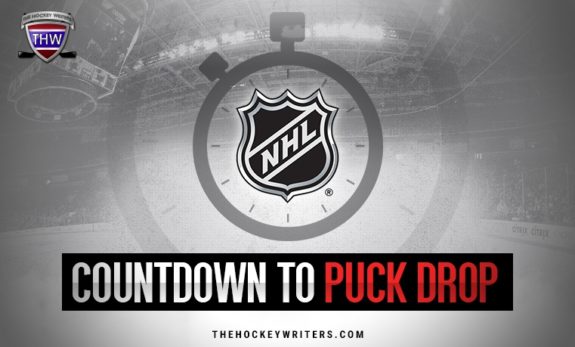Introducing The Hockey Writers’ Countdown to Puck Drop series. From now until the puck drops on the 2019-20 NHL’s regular season on Oct. 2 when the Toronto Maple Leafs host the Ottawa Senators, we’ll be producing content that’s connected to the number of days remaining on that particular day. Some posts may be associated with a player’s number, while others will be connected to a year or length of time. We’re really excited about this series as we take you through the remainder of summer in anticipation of the return of NHL hockey.
Undoubtedly the greatest NHL player to ever wear No. 71 on the back of his sweater, Evgeni Malkin has all the makings of a future Hall of Famer. He’s lifted the Stanley Cup several times and taken home several prestigious awards, including the Calder and Hart Trophies. Now, with the Pittsburgh Penguins’ window to compete slowly closing, it’s up to Malkin to push his team through the postseason once again.

There’s no denying that the Penguins’ 2018-19 campaign was a disappointment. They notched 100 points, good for third place in the Metropolitan Division, before getting effortlessly swept by the New York Islanders. Malkin was tied for the team lead with just three postseason points and was one of only three Penguins skaters to record multiple points in the quick four-game series.
Heading into the 2019-20 NHL season, Pittsburgh’s long run of competing inches closer and closer to its demise. As long as Malkin and Sidney Crosby are together, the team will always be dangerous, but a sticky cap situation and aging core are making it more difficult. At least for this season, the Penguins ability to make a Stanley Cup run will lean on the performance by the big Russian forward.
Staying Healthy Is Key
Over the last six seasons, Malkin has missed 98 games and only played over 70 games in a season once during that span. The 6-foot-3 center turns 33 years old at the end of the month; as he approaches his mid-30s, Malkin will have a harder time shaking off minor injuries and staying on the ice consistently.
He was held out of 14 games last season, including eight straight during March and April with the team going 4-2-2 in his absence. Overall, the difference with and without Malkin was alarmingly obvious:
With Malkin: 38-21-9, 3.51 goals per game, plus-35 goal differential
Without Malkin: 6-5-3, 2.43 goals per game, minus-3 goal differential
The proof is in the numbers: the Penguins need Malkin on the ice to succeed. This isn’t new information, though. Of course teams play better when their superstars are healthy and suiting up nightly. However, with his injury history and the Penguins drastic drop in production without him, his ability to play 75 or more games next season could decide the team’s fate.

Malkin also stepped up without Crosby in the lineup. Pittsburgh went 0-2-1 with their No. 1 center in the press box, but Malkin managed to notch two assists in each of those three contests. It goes without saying that the Penguins need both of their superstar centers on the ice to make any noise in the postseason.
Can Malkin Find Offensive Consistency?
Tying in with his ability to stay healthy, the big-bodied Russian also has to find a way to make a more consistent impact when he’s on the ice. He had stretches of dominance last season while at other times he felt lost on the offensive end. Not only did his scoring numbers look worse, but his advanced metrics did as well; his 50.3 Corsi percentage is the worst he’s posted since the 2012-13 season. Not to mention his career-worst minus-25 rating.
Most NHL skaters would love to score over a point per game with positive advanced metrics in a season, but for Malkin, the expectations have always been much higher. He came out of the gate firing last season, scoring seven goals and 20 points in his first 11 contests. However, it took him the following 27 games to record his next 20 points. Of his 68 games in 2018-19, Malkin was held without a point 20 times and posted 17 multi-point efforts. In 2016-17, when he scored the same amount of points (72) in 62 games, he recorded 21 multi-point games and went scoreless just 17 times.

During the Penguins’ back-to-back Stanley Cup runs in 2016 and 2017, Malkin combined for 16 goals and 46 points in 48 postseason games. He’s been a big playoff producer for most of his career, scoring at over a point-per-game pace in his 162 postseason contests. With how tight the Eastern Conference, and especially the Metropolitan Divison, looks next season, the team needs Malkin to tap into his clutch-time performances a bit early.
Malkin is already the greatest NHL player to ever sport the No. 71 sweater and could be on his way to having the Penguins retire his number after he hangs up the skates. If he leads the franchise to another Stanley Cup title, possibly earning his second career Conn Smythe Trophy, the team wouldn’t have a choice at that point.